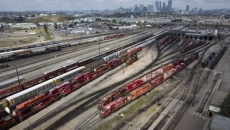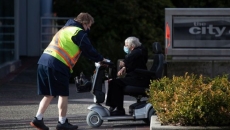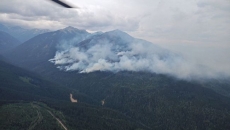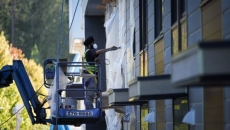British Columbia's former chief coroner is criticizing plans by two of the province's major political parties for involuntary treatment of people with drug addictions, saying there's little evidence it works and more people will die.
Lisa Lapointe emerged from retirement in the starting days of the B.C. election campaign to throw her weight behind a BC Green Party campaign pledge to expand prescribed safer supply of opioids and other drugs to deal with the province's deadly overdose crisis.
Political leaders fanned out their campaigns across the province Tuesday, with NDP Leader David Eby in Terrace in the province's northwest, while B.C. Conservative Leader John Rustad went to the southeast, in Kimberley, where he criticized the Greens' drug plan, calling decriminalization and safe supply "nonsense."
We have the solutions to end this crisis, we just need the will to act. The evidence-based policies that experts have long called for are within our reach, and by implementing them, we can save lives. https://t.co/6odQ3TXF75
— Sonia Furstenau (@SoniaFurstenau) September 24, 2024
Rustad also confirmed that he regrets getting vaccinated for COVID-19, a day after a video surfaced of him telling a group of former public servants who believe they were discriminated against that he regretted getting the "so-called" vaccine.
Rustad told reporters Tuesday that after getting his second vaccine he had heart problems and when he went to get his third shot "the question they had for me was only one word, 'Moderna?' And to me, that tells me that there has been some issues, and so, from that perspective, I do regret getting the COVID vaccines."
Both the governing New Democrats and the B.C. Conservatives have campaigned on promises to bring in a form of involuntary treatment, if elected, but Lapointe said at a news conference in Victoria with Green Leader Sonia Furstenau, that there's little evidence to support the idea.
"We need to be very careful before we jump off this involuntary care cliff as the answer to this very complex public health emergency. We know people die after treatment. We know that involuntary care has very little evidence to support its effectiveness. What would really help people is having access to the care they need much further upstream," she said.
Lapointe said people can't access family doctors or mental health supports and are stuck on long waiting lists for any sort of treatment they want to attend.
"If people can't access the voluntary care that they're trying to access, how can we then incarcerate them involuntarily when there's no evidence that that would be successful?" she said.
"We are just setting ourselves up for a disaster, and more and more and more people will suffer the effects of substance use disorder, and more people will die, more families will be harmed."
Figures from the BC Coroners Service say more than 15,000 people have died in the province from overdoses since a public health emergency was declared in April 2016.
A report on care options for people with severe addictions released by the NDP government as it announced its plans for involuntary care earlier this month says "there is insufficient high-quality evidence regarding the effectiveness of involuntary care" for people with substance use disorder.
Furstenau said other party leaders have indulged in unacceptable "dehumanizing rhetoric" against drug users.
She said a broader system of prescribed safer supply of drugs, including fentanyl, is needed, as well as a "demedicalized model" to reduce stigma and barriers in the current system.
She said a Green government would regulate treatment and recovery programs and gather data to track outcomes and availability.
"We have hundreds of millions of public dollars going to treatment and recovery programs that are not required to provide data. They're not required to provide evidence that their programs work," she said.
"So, with urgency, we need the province to take on the responsibility of regulating treatment and addictions programs."
The Greens are also promising drug education in schools and enhanced mental health support.
Lapointe retired earlier this year after 13 years on the job and in the midst of the toxic drug crisis.
Before her retirement, Lapointe lamented that the emergency never received a "a co-ordinated response commensurate with the size of (the) crisis."
In her final months as chief coroner, a review panel recommended providing controlled drugs without prescriptions but the idea was almost immediately rejected by the provincial government.
Elsewhere on the campaign trail, NDP Leader David Eby is in Terrace in B.C.'s northwest looking to win back the Skeena riding that is being vacated by Ellis Ross, who held the seat for BC United, but will now run in the federal election for the Conservatives.
The NDP announced it had nominated candidates in all 93 ridings for the Oct. 19 election. The party says the slate is 60 per cent women.
In Kimberley, Rustad released his party's campaign pledges for the mining industry, promising to simplify permitting, cut redundant regulations, invest in rural infrastructure, and foster strong Indigenous partnerships.
All three leaders are scheduled to debate each other two days before advance polling opens.
A consortium of broadcasters announced the Oct. 8 debate will air from 6:30 p.m. to 8 p.m. on all major television and radio news networks and be moderated by Angus Reid Institute president Shachi Kurl.






